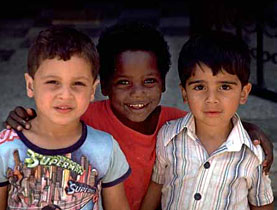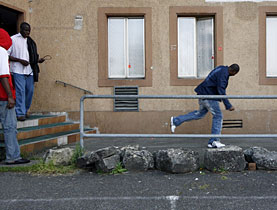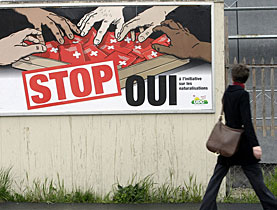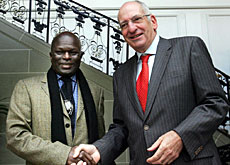Switzerland defends anti-racism stance

Switzerland has been defending its race relations record before a United Nations committee in Geneva on Monday.
Summing up, the UN Committee on the Elimination of Racial Discrimination said there was room for improvement but the Swiss were motivated and taking the issue seriously. However anti-racism campaigners criticised a lack of progress.
Switzerland was one of eight countries presenting its progress report on efforts to implement the International Convention on the Elimination of all Forms of Racial Discrimination.
Switzerland’s anti-racism record has been under the spotlight recently. During the UN Human Rights Council’s Universal Periodic Review in May 2008 the Swiss had to answer numerous questions about the “xenophobic climate” in Switzerland, “incitements to racial hatred by certain political parties” and “racist posters”.
The UN special rapporteur on racism, Doudou Diène, also levelled tough criticism at Switzerland in a 2007 report for what he said were “discriminatory tendencies”.
In its presentation on Monday the Swiss delegation was asked to justify its current anti-racism stance, answering questions such as whether the federal structure was an obstacle to implementation of the convention.
Swiss officials admitted that certain foreigners faced a “hostile” environment but felt the situation was “comparatively good”, citing lower extreme-right violence and an increase in race-related legal cases.
In his preliminary concluding remarks, Pierre-Richard Prosper, the UN special rapporteur said Switzerland had made progress since 2002, in particular in the field of criminal law and police training, but “could do better”.
In particular, the committee was looking for “top-down” leadership from the Swiss government to help change mindsets and for it to be a “champion for this cause”, he said.
Limited progress
But a coalition of non-governmental organisations attacked Switzerland for failing to respond to criticism and recommendations made in 2002 to tackle racism.
“Progress has been made in certain areas, but most of the committee’s previous recommendations have not been met,” Christina Hausammann, the coalition coordinator, told swissinfo.
The whole discussion about integration measures, the necessary finance, and cantonal integration offices and delegates was a positive step, she said.
But Hausammann bemoaned the lack of effective instruments or structures in Switzerland to ensure the convention’s implementation, as well as the absence of an anti-discrimination law.
“We have no federal human rights institution that could monitor all these anti-racism problems and advise the cantons,” said the coordinator. “The existing independent Federal Commission against Racism does good work but has limited resources and a very narrow mandate.”
In its alternative “black book” report, the coalition of 14 NGOs said discrimination against black people, Muslims, people from southeastern Europe and asylum seekers had increased over the past six years.
In particular, the plight of people in detention prior to deportation was “problematic”, leading to victims of racial abuse and attacks without any kind of protection.
Police violence, particularly against black people and asylum seekers, was still an area of concern, it added.
Xenophobic stereotypes
The Federal Commission against Racism, which contributed to the UN review, was less severe in its overall assessment of Swiss efforts.
But it reserved criticism for the treatment of blacks, Muslims, asylum seekers and foreigners, which had not improved since 2002, it said, echoing the NGO coalition.
“Right-wing parties and parts of the media continue to cling to xenophobic stereotypes that find concrete expression in repeated political demands and referendum campaigns”, it stated.
The new foreigners law, which entered into effect on January 1, 2008, is also criticised by the federal commission for creating a negative image against citizens in Switzerland from non-European Union/European Free Trade Association countries who are subjected to a complicated web of rules under the new legislation.
swissinfo, Simon Bradley in Geneva
The convention, which entered into force on January 4, 1969, established the Committee on the Elimination of Racial Discrimination (CRED) to oversee obligations. The convention has been ratified by 173 states.
Each state is required under article 9 to submit an initial report on the legislative, judicial and administrative measures which it has adopted and which give effect to the convention.
The report must be submitted within one year of a government’s ratification of the treaty and thereafter every two years.
The committee is holding its 73rd session in Geneva from July 28 to August 15, 2008 to review anti-discrimination efforts undertaken by the governments of Ecuador, Namibia, Togo, Russia, Germany, Austria, Switzerland and Sweden.
Representatives present the report, discuss its contents with committee members, and answer questions.
In May 2008 Switzerland agreed to step up efforts to prevent and fight xenophobia as part of its examination under the UN Human Rights Council’s Universal Periodic Review. During the review there were numerous questions about the “xenophobic climate” in Switzerland.
The UN special rapporteur on racism, Doudou Diène, levelled criticism at Switzerland in a 2007 report for what he said were “discriminatory tendencies”.
According to the Federal Commission against Racism, there were 49 racist incidents in 2006 – a new record for Switzerland. It said there had been 355 reported cases of racism since 1995. In all, half have been prosecuted. The Swiss-based Foundation Against Racism and Anti-Semitism believes the real figure to be roughly 300 per cent higher.

In compliance with the JTI standards
More: SWI swissinfo.ch certified by the Journalism Trust Initiative




You can find an overview of ongoing debates with our journalists here. Please join us!
If you want to start a conversation about a topic raised in this article or want to report factual errors, email us at english@swissinfo.ch.